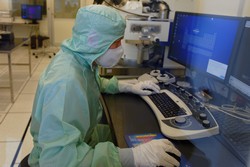ESMI—Infrastructure for soft matter research
The EU is aggressively pursuing research and technology development in the growing field of soft matter nanosciences and nanotechnology. One area crucial of importance to materials research is a coordinated network of leading infrastructures. The ESMI (European soft matter infrastructure) project was set up to provide transnational access to the most important synthetic techniques, simulation capabilities and world-class experimental infrastructures. The resulting network, plus training of young soft matter scientists and dissemination of important results, have supported and enhanced research into novel, tailored smart soft matter materials. The EMSI infrastructure comprised an experimental platform, a synthesis platform, and a theory and simulation platform. The first covered spectroscopy, microscopy, scattering methods and rheology. The second dealt with inorganic and organic nanoparticles and polymers, whilst the third covered high performance computing, algorithms and codes. About 2700 days of access to facilities and more than 120,000 Tflop-hours of computing time was distributed to the users community. The joint research activities in this network were dedicated to improve the infrastructure offered for access. Project partners developed new synthesis routes to strengthen the basis for new materials used in the soft matter field. Specifically, the following three research areas were addressed. Surface modification methods for nanoparticles were developed in order to make them compatible with organic matrices such as polymers. Further, novel polymer bio hybrids were synthesized by combining polypeptides and polycopeptides with synthetic polymers to combine the properties of peptides and synthetic polymers. Finally, the production of polymers with special architectures such as ring or branched polymers in larger quantities and of a higher structural quality was achieved. Further a variety of experimental characterization techniques was advanced or newly developed, among which the most prominent are: optimized transmission electron microscopy for soft matter, to improve resolution and reduce beam damage, new nano-dielectric spectroscopy techniques in combination with atomic force microscopy for the mapping of dielectric surface properties, unique instrumentation for advanced interfacial rheology and real time analysis of confocal microscopy data. Theoretical support for analysis of experimental data was provided to users by qualified ESMI scientists. ESMI also provided a complete toolbox for soft matter scientists, leading to a significant increase in their productivity. The consortium organised schools and lab courses, as well as meetings and conferences. ESMI main achievement has been the successful integration of European soft matter science in three directions: building networks across scientific disciplines, connecting different research methodologies and linking academia with industry. This will have a significant impact and synergy on soft matter research and so strengthen Europe’s position in a field that will become increasingly important in the future. The close involvement of industry in all activities will improve the level of basic understanding of soft matter properties among industrial researchers. This will enhance the options for knowledge-based rational design of materials and products, resulting in a more effective use of resources and increased environmental sustainability. EMSI has therefore made a significant contribution to research and technology development in the field of soft matter related to the nanosciences and to nanotechnology. The resulting tools and training will have an important impact on the competitiveness of EU scientists and on the evolution of an entire sector of the economy.
Keywords
ESMI, soft matter, transnational access, scattering, spectroscopy, imaging, colloid and polymer synthesis, supercomputing

